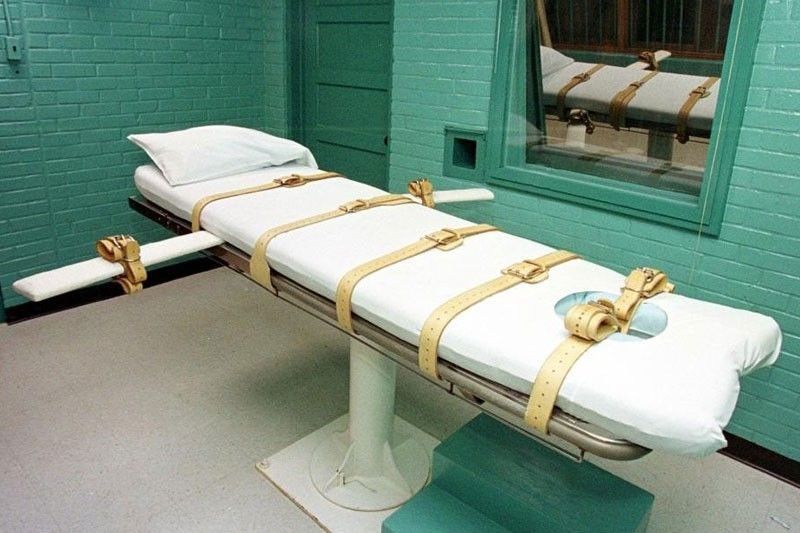Lawmakers split on proposed revival of death penalty

MANILA, Philippines — Lawmakers expressed opposing views on the call of President Duterte to revive the death penalty during his fifth State of the Nation Address (SONA) on Monday.
Surigao del Norte Rep. Robert Ace Barbers and Muntinlupa City Rep. Ruffy Biazon supported the proposal while Buhay party-list Rep. Lito Atienza and Bayan Muna party-list Rep. Carlos Zarate opposed it.
Barbers, chairman of the House committee on dangerous drugs and one of the principal authors of the death penalty revival bill, reiterated the President’s call.
The House passed the bill on third and final reading during the previous Congress, but it was not taken up by the Senate.
“Re-imposing death penalty on drug related offenses will stop criminals from plying their trade and give our youth a breather as we put in place more measures to secure their future,” Barbers said.
Biazon, another author of the bill, said the death penalty is appropriate for major drug traffickers.
He said there is a need to strengthen the prosecution on drug cases by strengthening the evidence-gathering of law enforcement.
“The penalty is important. But before the penalty, a successful prosecution is much more important,” Biazon said.
Zarate and Atienza objected to the measure, saying it is not a crime deterrent.
“The revival of death penalty as a deterrent to crimes is a sham claim, especially coming from an administration that has launched a bloody anti-drug campaign and yet, until now drugs is still a brisk and lucrative business in the country,“ Zarate said.
Atienza said the death penalty would only strengthen the hands of those who are abusing their power in government.
Duterte noticed the lukewarm stand of lawmakers on his proposal as only a few applauded when he raised the matter during SONA.
The House, through Majority Leader Martin Romualdez, gave assurance that the measure will be throughly deliberated on in the plenary.
50-50 chance
Senate President Vicente Sotto III said the proposal has a 50-50 or more chance of getting passed at the Senate if the capital punishment will be limited only to convicted high-level drug traffickers.
Sotto, who has filed a bill seeking to revive the death penalty, admitted there is still strong opposition to the measure among senators, but said things could change, especially with President Duterte giving it a push in the SONA.
“As of now, I think it’s about 50-50 chance – there could be just one (senator) who will not be able to vote – it’s very difficult to say. But for high-level drug trafficking, we stand a good chance of getting 13 votes minimum,” Sotto told journalists through a video conference.
He said the bill stands a better chance as Duterte wants the death limited to crimes under Republic Act 9165 or the Comprehensive Dangerous Drugs Act of 2002.
Sotto said his bill limits the punishable only to high-level drug traffickers, not street-level pushers.
There are similar bills filed in the Senate seeking to re-impose capital punishment, including those filed by Sens. Panfilo Lacson and Manny Pacquiao, but they include other heinous crimes like rape as punishable by death.
Sotto cited his around 30-year experience in debating on the death penalty, wherein he was convinced by those opposing the proposal that imposing such may cause injustice to poor suspects, who may be convicted only because they could not afford good lawyers.
“There’s no poor high-level drug trafficker. In fact, we have many high-level drug traffickers in the Bilibid (New Bilibid Prisons) and they still do business from prison,” he said.
He noted the Supreme Court had upheld the repealed death penalty law as being constitutional and humane.
He said Duterte’s push for lethal injection was classified as humane by the high court.
Meanwhile, Sen. Richard Gordon, who chairs the committee on justice that will hear the bills, opposed the proposal, saying he was not too keen on conducting hearings on the matter.
“I’m gonna be fair and they can do that while I’m hearing it. I promise you, if we do hearings, we’ll hear everybody. And if they think I could not do the job fairly, objectively, then I’ll say so,” Gordon said in an online press conference.
Sotto volunteered to chair the hearings if Gordon is not eager to do so.
Gordon expressed alarm that Duterte was pushing for the death penalty when he and other administration officials and allies remain quiet on the thousands of unsolved killings that happen almost on a daily basis.
“The silence is deafening, there’s too many killings… My position is always clear. I don’t think the death penalty works. We get used to drug pushers being killed and we say ‘let it be’. That’s macho talk. What if it happens to our children?” he said.
He expressed dismay that such a proposal is being pushed amid the COVID-19 pandemic that must be addressed first.
Sen. Grace Poe opposed the death penalty, saying “without the needed reforms in our justice system, the innocent poor with scant resources to wage a decent defense in court will be the ones at risk in any attempt to revive the death penalty in the country.”
For Sen. Francis Pangilinan, the government should address the problem on COVID-19, hunger, unemployment and corruption instead of pushing for the revival of the death penalty.
Pangilinan said it is ironic that the country is in the middle of a pandemic and yet the administration is pushing for a measure that kills people.
“Lethal injection should be applied to COVID-19 and its contagion. The government should punish people who steal the funds of PhilHealth and Department of Health. It should focus on thousands of stranded people now staying at the Rizal Memorial Stadium, waiting to go home to the provinces.”
Breach of int’l law
The Commission on Human Rights (CHR) opposed Duterte’s call to revive the death penalty, saying it is a breach of international law.
CHR spokesperson Jacqueline de Guia said Duterte’s proposal runs counter to two affirmations he made during his SONA, which is putting human lives above all and not dodging the obligation to fight for human rights.
“Any move to reinstate capital punishment in the country conflicts with the tenets of the Second Optional Protocol to the International Covenant on Civil and Political Rights, which the Philippines ratified in 2007,” De Guia said.
The treaty recognizes that the abolition of the death penalty enhances human dignity and progressive development of human rights.
Its signatories agreed that no person would be executed within its jurisdiction, with state parties committing to abolish the death penalty after ratification of the optional protocol.
De Guia urged the government to engage in a frank and factual discussion on the ineffectiveness of the death penalty in curbing crimes.
“We too believe that crimes must be punished. But the call for justice should not result in further violations of human rights, especially the right to life,” she said.
Erap supports death penalty
Former president Joseph Estrada expressed support for the revival of the death penalty.
“The death penalty will minimize crimes in the country. I support its revival,” Estrada told The STAR in a telephone interview.
He said the death penalty would discourage people from engaging in drugs and crimes.
“It will reduce crimes. Illegal drugs is a menace to society. We see reports of children being raped and killed by drug addicts. It must stop,” Estrada said.
Although it supports Duterte’s call to revive the death penalty for drug-related offenses, the Philippine Drug Enforcement Agency (PDEA) said only major drug traffickers should be put to death and not street-level drug peddlers.
The revival of the death penalty should depend on certain quantities of illegal drugs confiscated from an individual or group, like being caught with at least a kilo of illegal drugs, PDEA chief Wilkins Villanueva said. – Paolo Romero, Cecille Suerte Felipe, Janvic Mateo, Jose Rodel Clapano, Robertzon Ramirez, Neil Jayson Servallos, Mayen Jaymalin, Roel Pareño
- Latest
- Trending
































